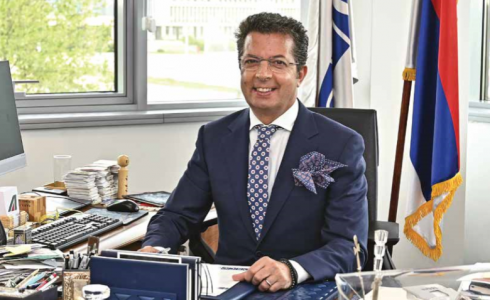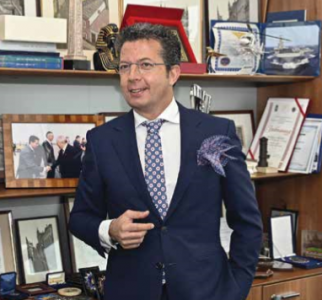Serbia to fully use the enormous potential of its brilliant people

“It has been a pleasure for me to lead the OSCE Mission to Serbia for the last two and a half years. This has given me the opportunity to get to know even better your beautiful country and to plunge into the challenges it faces in its reform path. Our role is defined by the Mission’s mandate, which was approved by all OSCE participating States, when Serbia requested the Organization’s help through a field operation, which is tasked with providing assistance and expert advice to Serbian authorities and civil society in the reform and modernization process of the country. Within the spectrum of the mandates of OSCE field operations, ours is the one that is most clearly defined by its assistance nature. The very guiding principles in delivering on our mandate are partnership with all relevant stakeholders – government bodies, independent institutions, the Parliament, professional associations, national minority representatives, academia – towards domestic ownership of reform achievements,” says at the beginning of the interview H.E. Andrea Orizio, Head of the OSCE Mission to Serbia.
What are the OSCE’s plans for Serbia in 2019?
— Our priorities include strengthening democratic institutions and practices, promoting the rule of law and media freedom and professionalism, combating discrimination, supporting Serbia in fulfilling its human rights commitments, as well as supporting a sustainable reform of the security sector. High on the Mission’s agenda is youth empowerment, as young generations play a vital role in building a democratic and inclusive society. The Mission targets youth and gender across all of its programmes, with a particular focus on regional connectivity and education. For example, we have been promoting a rule of law culture among youth through anti-corruption clinics; we supported media literacy training to enhance young citizens’ opportunities to participate in democratic processes; we also support education for national minorities and foster intercultural youth interaction across Serbia and the region, as well as the implementation of a child safety programme. Another focus of our work is supporting Serbia in combatting organized and cyber-crime. As organized crime cannot be effectively treated in isolation, the Mission assists Serbia in strengthening international and regional co-operation in combatting serious trans-national crime, cybercrime, international terrorism financing, trafficking in fire arms and human smuggling. In this vein, the Mission facilitated the establishment, for the first time, of a Permanent Conference of Specialized Organized Crime Prosecutors and supported its secretariat, currently based in Belgrade.
The OSCE Mission in Serbia co-operates with the Ministry of Interior of the Republic of Serbia on strengthening the capacity of the police in effective prevention and fight against corruption. What are the results?
— Corruption is recognized by Serbia as a significant challenge. Accordingly, the fight against corruption is one of the key priorities of the Mission. We work in partnership with all relevant institutions and stakeholders in Serbia, including the Anti-Corruption Agency, to strengthen both prevention and repression capabilities with the ultimate goal of ensuring full local ownership. The Ministry of Interior has been one of our key partners and we have been working together on strengthening the police capacities to fight corruption. Last month, I attended an event marking the first anniversary of the Anti-Corruption Department, established by the Ministry of Interior, within its Criminal Investigations Directorate with about 160 police investigators. In this relatively short period, they have managed to achieve significant results. During their first year they filed 500 criminal complaints against a total of 489 persons, with 279 suspects being arrested or detained. Of course, this work should not end with the investigation, and the courts need to process all these cases. In November 2016, Serbia adopted the Law on “Organization and Jurisdiction of State Authorities in the Suppression of Organized Crime, Terrorism and Corruption”, which came into force on 1 March 2018. The Law, among other things, envisaged that the Ministry of Interior will be the authorized institution for conducting criminal investigations, upon the order of the Specialized Department Prosecutor. In the current phase of our cooperation with the Ministry of Interior, the Mission supports specialized anti-corruption training courses for about 120 police officers on: qualifying economic crime and corruption offenses; recognizing evidence; employing special proofing measures; and in vestigating misuse of public funds.
What do you identify as the biggest problems in Serbia?
— My wish is for Serbia to be able to fully use the enormous potential of its brilliant people to enjoy a full rule-of-law society, based on merit, with institutions at the service of all of its citizens, regardless of the powers that be. This would help Serbia provide opportunities for youth within the country, preventing brain drain and enabling its remarkable human capital to flourish, thereby contributing to Serbia attaining the place that it deserves in Europe. To fulfil Serbia’s extraordinary potential, especially among its youth, rooting a rule of law culture in the nuts and bolts of the Serbian democratic system is probably the most burning challenge facing this country, as well as strengthening democratic institutions, in particular the Par liament, as nothing can replace open and inclusive parliamentary debate. We look forward to witnessing constant improvement in this domain. Furthermore, independent and regulatory bodies are an extended arm of the Parliament and, as such, can be its closest allies in exercising its oversight role, especially if they have financial autonomy. On the other hand, their recommendations ought to receive adequate attention by both the executive and the legislative. The best sign of support would be the timely implementation of their recommendations. Likewise, the appointment of the new Commissioner will be an important test for democratic governance. When it comes to attaining a healthier media environment and judicial independence, Serbia has made steps forward, but these processes are – everywhere and Serbia is no exception – to be completed. The quality and the implementation of constitutional amendments on the judiciary and of the new Media Strategy will define the direction that Serbia wants to take. Further engagement by the Serbian authorities and all stakeholders in these areas of fundamental importance for the consolidation of democratic reforms remains crucial. The fight against corruption is one of the core challenges ahead of the host country. The OSCE Mission has been active in this domain, supporting the authorities both from the preventive and the repressive angles, by providing expertise and fostering regional approach as indispensable. Our most recent activity with the Anti- Corruption Agency was a conference which received the support of Italy, focusing on the implementation of corruption prevention mechanisms thanks to the sharing of best practices.

The OSCE Mission to Serbia and the European Union Delegation to Serbia launched a three-year project titled “Support to Victims and Witnesses of Criminal Offenses in Serbia”. How is this project going?
— The project was launched in 2018, thanks to the generous support of the EU Delegation, in partnership with our main local counterpart and beneficiary, the Ministry of Justice, who selected the OSCE Mission to be the implementing partner. We are confident that together with the Ministry, the Mission’s efforts will result in domestic ownership of a national victim and witness support system. For example, the most important milestone for our project – putting in place a strategic framework for enhancing the rights of victims and witnesses which will direct Serbia’s policymakers in the coming years – is underway. This project aims to assist the host country to introduce functional mechanisms enabling witnesses to testify in an atmosphere of respect and dignity, without fear from retaliation by countering the negative effects of secondary victimization during the criminal justice procedure. To this end we are working with our partners to establish a national victim support network. This way, not only victims of crime will be empowered, but also the overall effectiveness of the justice system will be improved by enhancing the quality of evidence (victim testimonies) made available to the courts.
How do you assess the state of media freedom and freedom of speech in Serbia? How satisfied are you with the draft media strategy?
— Freedom of expression is a fundamental human right and media freedom represents an essential element of every democracy. Without them, there is no free and open society and accountable governments. According to a recent report by Reporters without Borders, Serbia is not a safe country for journalists. In my opinion, all relevant stakeholders in Serbia are investing serious efforts in order to further improve media freedom, professionalism and literacy. For example, the police and prosecution have resolved the case of the arson attack on the house of Milan Jovanovic, journalist of Žiginfo. The trial for this crime started on 9 April and we are closely monitoring the developments. We have recently seen a first instance court’s decision convicting the perpetrators responsible for killing journalist Slavko Ćuruvija 20 years ago. These are positive steps. There are a number of other cases, however, that still need to be investigated, which reminds us that there is still a lot of work ahead of us. The OSCE Mission to Serbia stands ready to add value to the important work of our partners and to further support the dialogue on this crucial topic. The Draft Media Strategy that was produced last year is a thorough and balanced policy document. It is an important tool that, if adopted in its current version and implemented properly, could lead to a healthier media environment, rooted in media freedom, ethics and professionalism, and paying due attention to developing media literacy among citizens. The Mission used its convening power to help produce this document in an atmosphere of debate and inclusiveness, with all proposed goals having been carefully considered and discussed with over 150 stakeholders. The Mission also assisted the Working Group by pointing to different democratic practices and international standards in all of the strategic issues in media reform. The follow up debate was also very rich and we sincerely hope that the suggested solutions will provide a good basis for moving forward the reform process in this domain. We are eagerly waiting for the final adoption of this document and we stand ready to support its implementation, as only truly independent institutions and an advanced regulatory framework can ensure the full exercise of freedom of expression by free media and safe journalists.
INDEPENDENT JUDICIARY
You have offered co-operation and proposals to parliament to bring reforms to an independent judiciary. What does Serbia need to do in this field?
— The OSCE Mission to Serbia has been supporting Serbia’s process of constitutional reform from the onset, aimed at attaining separation of powers with a special focus on judicial independence. We facilitated inclusive debates and provided focused expertise on possible solutions for ensuring judicial independence, accountability and efficiency. Throughout this process, we have encouraged relevant stakeholders to go beyond the minimum standards offered in the range of options included in the Venice Commission’s Opinion. Speaking about the selection procedure for candidates in judicial positions, the main goal is to develop a merit-based, transparent and fair selection process. Serbia can design its own model, also on the basis of best practices from the OSCE area and decide which institution or institutions should be in charge of appointing, promoting, training, organizing and disciplining judges. It is crucial that such an institution, or institutions, be independent and efficient, composed by members free from political interference including from the legislative and the executive. The OSCE now stands ready to assist the Parliament in its deliberations on the draft amendments, which is a great opportunity for the National Assembly and its committees as well.